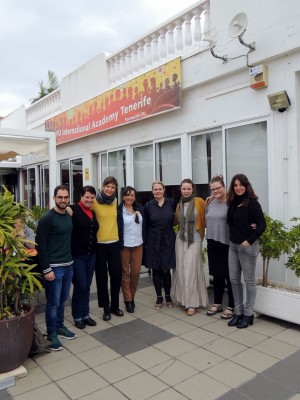
A training course for teachers of Spanish entitled Curso para profesores de español no nativos was held in the city of Puerto de la Cruz located in the northern part of the island of Tenerife between 7th – 11th March 2016. There were four participants in the course (two teachers from Denmark, one from Norway and myself). The course was held in a language school which is attended by different profiles of learners (groups are heterogeneous with learners from different countries; in addition to high-school and university students there are also quite many adults who want to learn or improve their Spanish). Before the start of the training course, we were invited to fill out a longer questionnaire on the topics we want to concentrate on, the activities we want to become familiar with and the chapters of the Spanish language and culture we want to pay special attention to. We also had a great opportunity to exchange good practice with each other.
One part of the course was dedicated to attending different Spanish language courses ranging from A1 to B2. After the visits, we paid attention to various topics discussed in these courses (such as ser y estar, el subjuntivo, el factor lúdico en la enseñanza del léxico, la teatralización como recurso en el aula, el contraste entre los pasados, la tecnología en la enseñanza de idiomas) and enriched them with examples of good practice, reflections and exchanges of didactic materials. In the afternoons, we took part in different activities (lectures on culture, language, history, sports, holidays on the Canary Islands, etc.) or did some sightseeing (Museum of El Teide National Park, botanical gardens …). I really appreciate the professional and friendly attitude of our teachers both during the classes and in the free time. I would like to stay in touch with them via social platforms to exchange materials for teaching Spanish. The selected topics that were discussed in the course are very useful for teachers of Spanish. It was interesting to see how particular grammar issues are practised at different levels. In the past, the Canary Islands were a link between Europe, Africa and Americas, which is reflected nowadays in the language (vocabulary, intonation, and pronunciation), architecture, culture, and society. Spanish as a world language is very diverse, therefore, it is extremely important to be able to present and spread the knowledge of the Spanish-speaking world to your students.
I informed our foreign language teachers’ group about the training course. In addition, I will also share the materials I got at the course with my colleagues. /Daša Deželak Oberč/